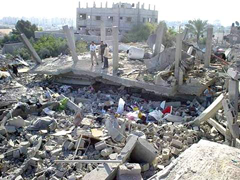
One predictable result of the Israeli attack on Gaza: North American bloggers prefer to attack each other rather than discuss the war.
Glenn Greenwald, a prominent left-winger, accuses Michael Goldfarb of displaying a racist attitude towards the Palestinians in Gaza. Right-winger Robert Stacy McCain ("The Other McCain") then criticizes Greenwald.
Canadian bloggers also prefer to discuss compatriots they don't agree with. Dust My Broom criticizes pro-Hamas demonstrators in Toronto and asks: "How long before our good guys throw off their 'free-Gaza' cloaks and simply release their inner Jew hater?"
Meanwhile, Sean at Beyond Robson offers an anecdote on a cordial encounter with an old acquaintance who was demonstrating for Israel while Sean, across the street, was demonstrating for Gaza.
Going to the sources
While some bloggers do debate the war, they generally do so in terms of what they read in the mainstream media and one another's blogs. In the age of the World Wide Web, why not go to the closest possible sources?
The Israelis themselves are blogging hard about Gaza. Even the Israel Defense Force has its own blog, IDF Spokesperson, offering up-to-date reports.
But plenty of ordinary Israelis are blogging the war as well. One is A Soldier's Mother, who chronicles her anxiety about the safety of her son, while providing links to many other Israeli and pro-Israel blogs. At Not a Fish, "Imshin" reports on the general state of affairs inside Israel.
The war's moral issues are important to Israeli bloggers. At The Magnes Zionist, the pseudonymous Jerry Haber grapples with the moral justification for bombing the whole family of a Hamas leader. Yael at Aliyah discusses the concept of "proportional force" in international law.
The view from Gaza
The bloggers in Gaza include Dr. Mona El-Farra, who runs From Gaza, with Love, where Mohammed Fares El Majdalawi writes:
"We and my family cannot communicate with our relatives and friends because of the lack of the connecting network also every hour we have a martyr or even more because of the raining missiles on our homes, mosques, and even hospitals, There is no safeplace we can go to."
Gaza Strip, The Untold Story is run by Sameh A. Habeeb, who even provides his e-mail and Skype address. Since foreign journalists haven't been able to enter Gaza, he's doubtless getting a lot of calls.
The author of In Gaza appears to be an English-speaking woman named Eva. She's been in Gaza for some time and provides up-to-date news reports and a long list of Palestinian and Gaza blogs. At Tales to Tell, another English speaker posts minute-by-minute reports.
At least one Palestinian expatriate is blogging the war. At Raising Yousouf and Noor, Laila El-Haddad, a journalist based in Durham, North Carolina, talks about both the war and her own reporting of it on CNN.
During the Lebanon war in the summer of 2006, Israeli and Lebanese bloggers were actually talking to one another, but no such dialogue seems to have emerged as yet in this conflict. Still, it's extraordinary that we can, if we wish, follow the war through the eyes of ordinary people on both sides of this conflict -- and we can even post responses on their blogs.
If we prefer to discuss it only among ourselves, when we could talk to the combatants, we engage in a dialogue of the willfully deaf.
Related Tyee stories:
- Canadian blogosphere divided over Gaza
- Talking with Rachel Corrie's Mom and Dad
Their daughter, killed by Israeli forces in Gaza, speaks in a controversial play. - The Cartoon 'Palestine'
Joe Sacco's brilliant journalism in cartoon form.
Read more: Rights + Justice, Science + Tech
















Tyee Commenting Guidelines
Comments that violate guidelines risk being deleted, and violations may result in a temporary or permanent user ban. Maintain the spirit of good conversation to stay in the discussion.
*Please note The Tyee is not a forum for spreading misinformation about COVID-19, denying its existence or minimizing its risk to public health.
Do:
Do not: